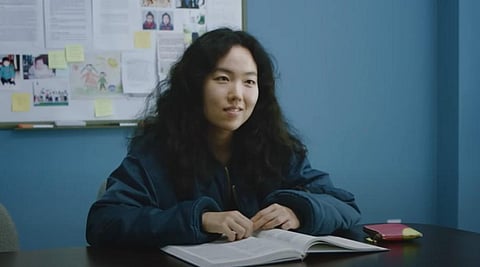

The films of East Asian filmmakers have a vibe that I don’t find elsewhere. They can make the most extreme of violent thrillers and the most peaceful character dramas, and they excel at both in a way that no other filmmakers do. Cambodian-French filmmaker Davy Chou’s second feature, Return to Seoul, belongs to the peaceful variety. Featuring characters conversing in French, English, Korean and Japanese, the film chronicles the attempts of a twenty-something woman, Frédérique ‘Freddie’ Benoît (Ji-Min Park), to reconnect with her roots and find her biological parents. For a debutant, Park reveals herself to be an exceptionally perceptive actor with an extraordinary grasp of her character, a French woman of Korean descent just like her.
It’s hard to believe that this is Park’s first film. When we are first introduced to Freddie, she is at a cafe in Seoul interacting with random strangers and ‘rearranging’ them around her, as though she is trying to build a community and sense of family that she never had. That seems to be the case when Freddie is, of course, revealed to be a French adoptee in Korea to trace her origins. (Lulu Wang’s The Farewell—another film about reconnecting with one’s roots—would make a terrific double feature with this one.)
The conversations in the early portions may seem ordinary but got me thinking of different things, primarily the nature and beauty of various languages, adopting a different culture, and the idea of building a family not necessarily of one’s own blood.
It’s about the willingness to be open to other cultures instead of alienating them. Return to Seoul made me also reflect on the changes in tone and emotion in words depending on the language, how the meaning of some usages can get lost in translation, and the impact of grammatical errors on communication and, in so doing, got me thinking about how we perceive and consume foreign language films. Are the subtitles translating everything as it is? What does something mean in terms of the cultural context? Do we perceive some emotions the same way they do? Do we feel more or less strongly about certain things? Isn’t it nice when a film makes you think all these thoughts? That’s the sign of, well, a great film!
Freddie is curious not only about others but also herself. For instance, she wakes up the next day with a stranger without any recollection of whether they slept with each other. It doesn’t matter to her because, the second time, she does it for the sake of remembering.
This is a film filled with beautiful close-ups of the actors’ faces. And it’s impossible to imagine any other approach because the actors here are great at expressing more through their faces than words.
Park, for one, uses her eyes really well. Be it a glance or a pause between each gesture and facial tick, it makes her character’s thoughts readily evident.
There is a notable stretch in the film where Freddie has to spend an unbearably long time with her biological father and his current family members, and we strongly feel the former’s discomfort and disbelief. Every character, no matter their screen time, has a distinct personality. The dramatic, religious grandmother who believes the Lord has forgiven them for abandoning Freddie, the father who keeps sending Freddie multiple messages because his guilt torments him. Freddie isn’t easily forgiving, but that isn’t her permanent state of mind.
Return to Seoul makes fascinating use of time. In one moment, an ongoing conversation can continue as a voiceover when it cuts to the next scene, where this interaction morphs into a ‘memory’. At one point, the film jumps forward a couple of years; in another, it shows Freddie’s life five years later.
Freddie is a different woman each time. The unpredictable, impulsive and shifty 27-year-old woman we saw at the beginning grows in maturity in the film’s latter segments. There is a change in costumes and hairstyles, aside from the type of men she gets into relationships with.
One of the film’s admirable qualities is its leisurely pacing. Be it the exteriors or interiors, it accomodates just the right amount of pauses to let us absorb all the details—buses, cars, homes, cafes, clubs... I don’t know if the makers shot it on film or gave it the film look in post-production, because if you have a thing for celluloid, Return to Seoul makes you realise how much you miss the format.
The vibrant colour palette and dreamy lighting recall the prevailing aesthetic of 80s’ Hollywood cinema, most notably the films of Michael Mann and Walter Hill. Further enhancement comes in the form of a catchy soundtrack featuring memorable music from generations both old and new, which is apt.
Film: Return to Seoul
Director: Davy Chou
Cast: Ji-Min Park, Guka Han, Oh Kwang-rok, Kim Sun-young
Streamer: Mubi